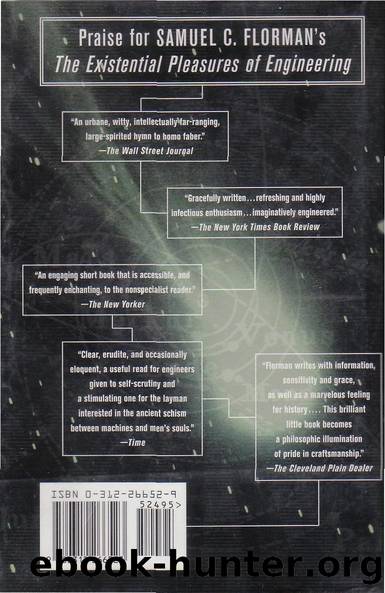The Aftermath by Samuel C. Florman

Author:Samuel C. Florman [Florman, Samuel C.]
Language: eng
Format: epub
Published: 0101-01-01T00:00:00+00:00
"We're on a roll," Richards roared with delight, "and while we're talking about quarrying, we might as well get into mining." With this he turned to Peter Mavimbela, the head of the miners' union. "What do you think, Peter?" he asked. "To get our industrial revolution underway, what we need is iron and coal, coal and iron, preferably close together and preferably not too far out in the boondocks. No matter what processes we decide to use in making steelâ and, Ichiro, with your guidance we'll be talking about that in due courseâwe know what the basic raw materials must be, and we can't have them too far apart from each other. Transporting these materials is going to be a big problem when we first get started. It's not like the good old days when long freight trains rumbled into Richards Bay bringing tons of coal and ore for shipment overseas."
"You don't need to remind me about what it pleases you to call the good old days," Peter Mavimbela said dourly. He was a tall man, but stooped and gaunt, with dark, dreamy eyes that belied his practical, political approach to life and to the issue under debate. He seemed about to launch into a discourse on mining under the apartheid government, but then thought better of it and spoke to the technical point at hand. "I think I can find you a placeâor possibly two placesâthat will be suitable. But there are a couple of things that we ought to get straight at the outset."
Alf Richards could tell that in Mavimbela he was dealing with a rugged individual, almost belligerent, a very different sort from the diplomatic Simon Kambule. There was a sudden feeling of suspense among the group, as if a serious confrontation might be brewing.
"Okay," Alf said. "What is it that we have to get straight?"
"First," Peter replied, "understand that this is not going be an efficient operation. Weâlike the farmers and timber workers and everybody elseâhave practically no tools. And when we finally get some, I am certain that they will be of relatively poor, or primitive quality. So we cannot go digging down into the depths of the earth. We'll have to begin by getting what we can from the surface. Where this is not possible, we will cut parallel tunnels into the hills and leave large pillars of material in place as supports for the tunnel roof. That way we won't have to install timbers, which are not available in any case. So, we'll be leaving lots of material in the ground; but that will have to do for a beginning."
"What's your other concern?" Alf Richards asked.
"My men," Mavimbela said, with barely concealed emotion. "In those 'good old days,' as you call them, the miners of South Africa were obliged to travel far from their families and live in prison-like dormitories. Now, I expect that decent housing will be provided for themâand their familiesâwithin a reasonable distance from the mines."
"That's no problem, Peter," the chairman said.
Download
This site does not store any files on its server. We only index and link to content provided by other sites. Please contact the content providers to delete copyright contents if any and email us, we'll remove relevant links or contents immediately.
The Fine Print (Dreamland Billionaires Book 1) by Lauren Asher(2367)
Fury of Magnus by Graham McNeill(2351)
The Last House on Needless Street by Catriona Ward(2129)
The Rose Code by Kate Quinn(2021)
Luster by Raven Leilani(1778)
Malibu Rising by Taylor Jenkins Reid(1754)
Transcendent Kingdom by Yaa Gyasi(1747)
Moonflower Murders by Anthony Horowitz(1681)
A Little Life: A Novel by Hanya Yanagihara(1667)
The God of the Woods by Liz Moore(1456)
The Lost Book of the White (The Eldest Curses) by Cassandra Clare & Wesley Chu(1449)
This Changes Everything by Unknown(1400)
The Midwife Murders by James Patterson & Richard Dilallo(1355)
The Lying Life of Adults by Elena Ferrante(1338)
The New Wilderness by Diane Cook(1318)
Written in the Stars by Alexandria Bellefleur(1307)
Wandering in Strange Lands by Morgan Jerkins(1264)
Ambition and Desire: The Dangerous Life of Josephine Bonaparte by Kate Williams(1253)
The Lying Life of Adults by Elena Ferrante;(1214)
